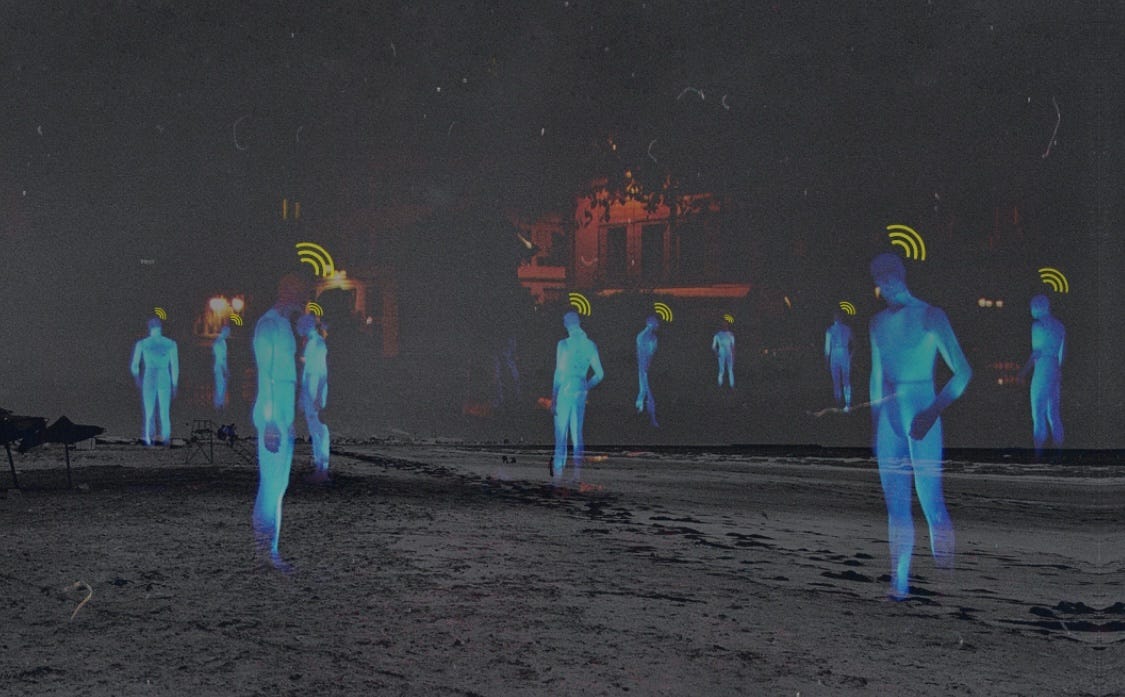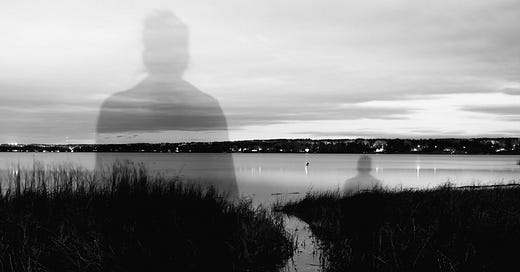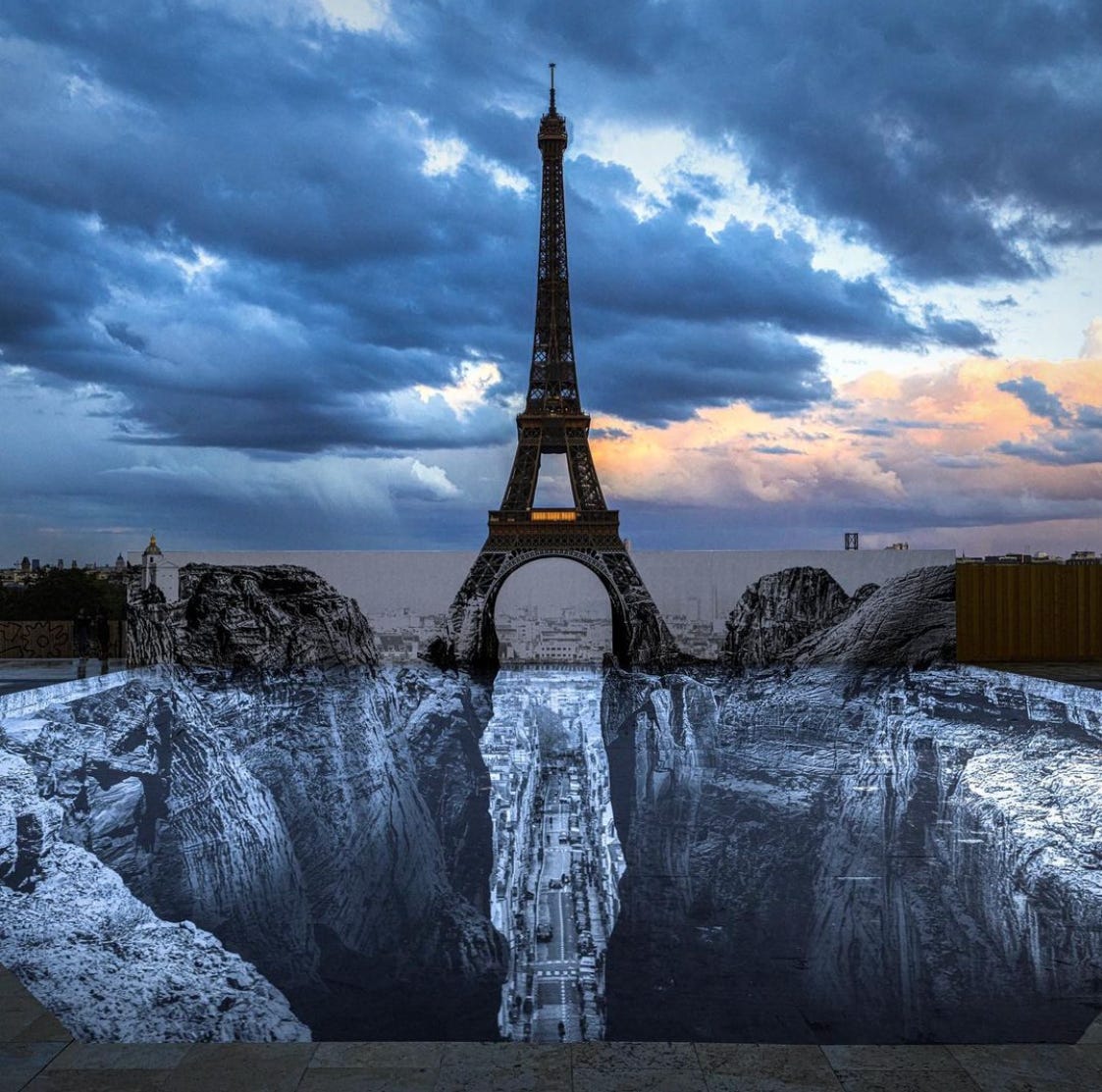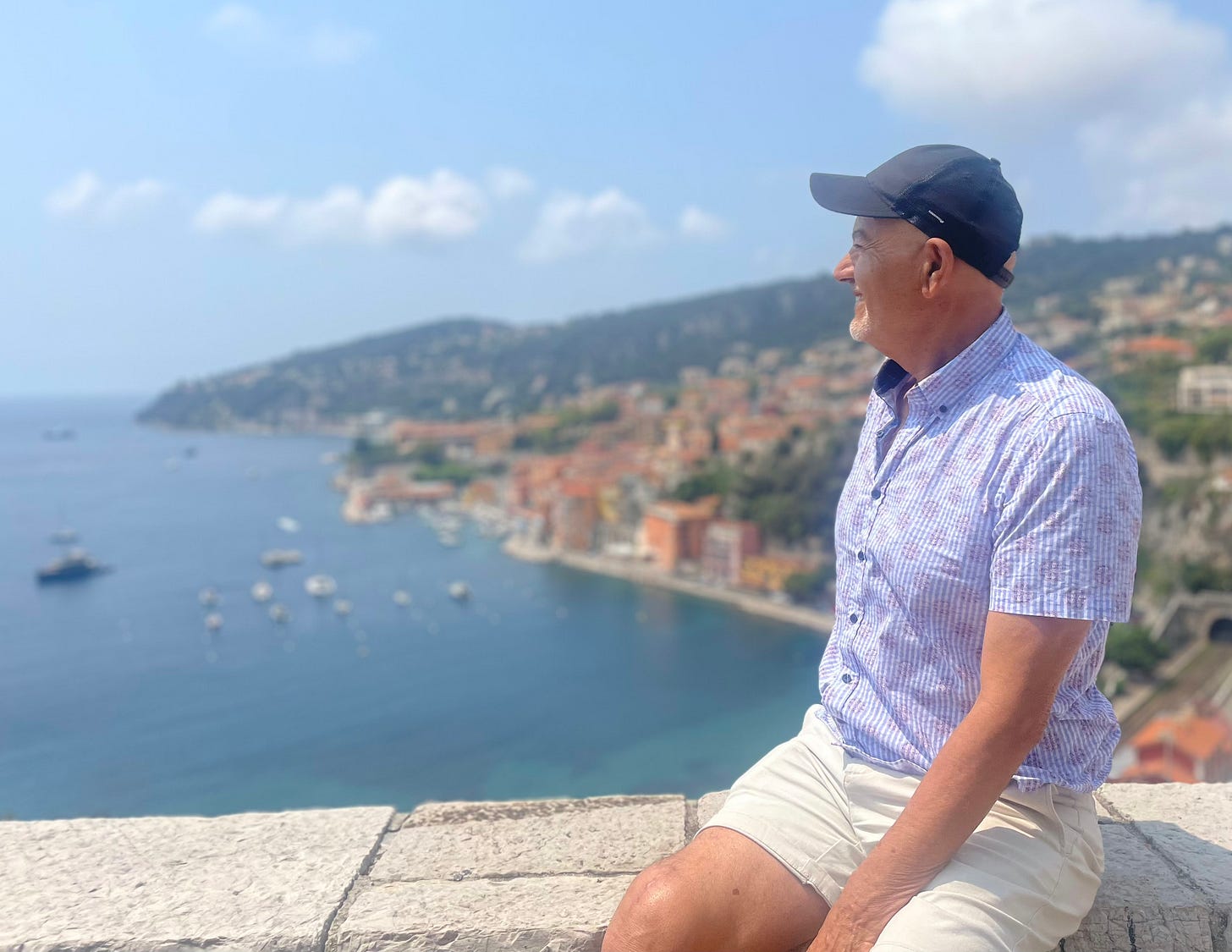Hi friend,
I was a particularly superstitious child. I lived in parallel realms of real-world thinking and magical thinking, abiding by the typical prohibitions, like avoiding sidewalk cracks, and also making up my own—for example, holding my breath when I saw roadkill until the next car passed as a way to release the animal’s spirit. Rather than dissipating with adolescence, my superstitions became more elaborate as time passed. Some of that was grounded in family tradition. I’ve written about how, whenever anyone leaves for a long journey, my dad splashes a cup of water on the back windshield of the car, a Tunisian custom meant to ensure someone’s safe return.
Perhaps the most recent and most haunting of my superstitions has been centered in the city of Paris, where I got sick at age 22, and where, when I returned for the first time almost a decade later, I fell acutely ill again.
It was supposed to be a celebratory reclamation of a city I left in haste; I wanted to mark the distance between who I was when I left in a wheelchair and the healthy, strong woman I had become. On my first day, I bought a pair of tennis shoes and walked for miles. I visited my old neighborhood in the Marais and stood outside my former apartment. I went to Shakespeare & Co., the famous bookstore where I’d signed up for a fiction class, hoping to become a writer. Over the course of that long walk, I began to feel sick, but I told myself it was in my head. But that evening, I got in bed feverish and weak, and there I stayed for the rest of my time in Paris. Only a few weeks later, a bone marrow biopsy showed that my greatest fear had come true: the leukemia was back.
When I shared this news with our community nearly two years ago, I vowed I’d never return to Paris again. For me, the City of Light had only brought darkness. So when my husband, Jon, was invited to play two shows in Paris this summer—one for President Emmanuel Macron at the Élysée Palace as part of the Fête de la Musique, and at Global Citizen Festival the next day at the Eiffel Tower, with Lenny Kravitz, Billie Eilish, and H.E.R.—my first thought was, “I’m definitely not going.”
I wasn’t the only one. When I asked my transplant nurse if I had the green light healthwise to go, her reply was, “Yes, but please don’t.” We both laughed because she’s obviously a woman of science, and we both know logically that my illness is not Paris’s fault. Such superstition has always struck me as an attempt at imposing order on the uncertainty of life. It’s an effort to gain some semblance of control over the uncontrollable.
But somewhere deep down, I knew I would go—and not just because I wanted to support Jon, not just because it was a once-in-a-lifetime opportunity. I knew I needed to remember in the sense that my dad writes about in his memoir-in-progress, Until the Desert Blooms, a book of stories about his childhood in Tunisia that he began over a decade ago, when I first got sick, and which he returned to when I relapsed. As Papa Hédi puts it in the prologue, “The word ‘remembrance’ comes embedded with the promise of hope and healing: to re-member is, at its root, to put back that which is broken.”
And so I came to Paris, though I was tentative, waiting for some omen, some symptom to appear. So far, none have. I arrived with Jon and my dad, and we went directly to the Élysée Palace, where we met up with Jon’s parents and some friends, where River canoodled with President Macron’s labrador, Nemo, where Jon played the most wonderful show.
It was surreal to be there in that gorgeous edifice. But there were so many other things happening in my mind and body—from the usual post-transplant exhaustion to the ever-present specter of relapse—that I felt grounded. Living in a sick body makes you acutely aware not only of how human you are, but how human we all are.
I can’t say that I’ve conquered my fears or that no superstitions linger. (I didn’t bring those tennis shoes with me, for example—that felt a step too far.) But I did put pieces back together. The next morning, we went to the Marais for a long, languorous lunch and then a stroll. That evening, we went to the Eiffel Tower to see Jon play again, which was incredible, and I sang along to Billie Eilish—to songs I listened to on repeat during my transplant, songs I’ll now remember in a new light, just like the City of Light.
Today, in honor of facing down our fears, and in honor of my dad—who grew up in Tunisia under French colonial rule, who there in the little Mediterranean town of Gabés never imagined that one day he’d spend a casual evening with the president—I’m sharing a first glimpse of his memoir-in-progress Until the Desert Blooms called “Shortening the Night.” It’s about fear and superstition, but also paradox—how sometimes progress isn’t progress, how sometimes darkness proves illuminating.
Sending love,
Suleika
Come meet us at the Hatch—
Today, June 25, from 1-2 pm ET, we’re meeting at the Hatch, our virtual creative hour for paid subscribers. We just marked the solstice and the advent of summer, and we’ll be drawing our inspiration from memories of long, hot days. Find everything you need to join us here!

Prompt 249. Shortening the Night by Hédi Jaouad
Night falls suddenly and quite spectacularly in my native town of Gabès in Southern Tunisia. The neighborhood would, seemingly in an instant, plunge into total darkness, except for our house, which was the only one connected to the town’s rudimentary and erratic electric grid.
In those days of ambient superstition, nighttime and darkness were a real menace: it was when the forces of evil came out to taunt the weak and confound the unbeliever. People hastily retreated to the safety of their dwellings, and when they had to go to the bathroom—usually in a traditional outhouse tucked in some remote corner—or venture out of the family compound to tend to an emergency, they did so by candlelight, almost always with a companion or in a small group.
The moonless nights were particularly frightening to us children, for it was a time considered in our local mythology most propitious for the apparition of ghouls, djinns, and other demonic creatures. Every shadow and whisper became ominous. People groped their way in the darkness, murmuring in the foreboding stillness of the night the famous Ayat al-Kursi, or the Verse of the Throne, reputed as the most powerful verse of the Quran to ward off evil spirits and other maleficent forces and spells.
Before the coming of radio and television to Gabès, and apart from the occasional wedding in the family or neighborhood, the only evening entertainment was storytelling, especially during the long, cold winter months. At night, the temperature dropped, and the cold became biting. We’d huddle under heavy blankets around a kanoun, a clay brazier filled with embers, to listen attentively to haunting stories of sorcery, magic, and the supernatural. These stories completely mesmerized us until we fell asleep.
Three matriarchs, all in their seventies or older, were particularly gifted at telling stories. My aunts Oumi Zohra, Oumi Salha, and Oumi Fatma were all widows, lived by themselves, and were our surrogate grandmothers. Either my mother, one of my siblings, or I would beg them to come to our house to “shorten the night,” the expression we used for passing time together, and they would often spend an evening of enchanting storytelling with us.
These women wove fanciful tales like they wove baskets. They always obliged our insatiable appetite with encores. My favorite storyteller was Oumi Fatma, who was almost blind. When she came, usually after many entreaties because she dreaded walking, it was a rare treat. On that special occasion, even the adults would stay to listen to her tales of witches, sorcerers, and magicians, for she had a knack for speaking of the uncanny.
With the advent of radio in Gabès in the early 1950s, such evenings began to lose their appeal. We began to gather around the wooden box, listening to distant voices and alien tongues. When we quickly grew tired of the radio, the matriarchs were no longer there to tell us stories, and since we had no books to read—not even the Quran, as my older brother liked to joke—a vital link was forever broken. I look back and feel a sense of loss, not only for our matriarchs and their stories, but also for those long and dark nights when we saw things that didn’t exist, when our imaginations were most alive.
Your prompt for the week:
What role did superstition play in your childhood? Was it indulged by the adults around you or scoffed at? Do any of those early beliefs still hold sway? Write about them, and why.
If you’d like, you can post your response in the comments section, in our Facebook group, or on Instagram by tagging @theisolationjournals.
Today’s Contributor—
Hédi Abdel-Jaouad is professor emeritus of French and Francophone studies at Skidmore College. The editor of CELAAN, a journal dedicated to the promotion of North African literature and art, he is the author of numerous articles and books, including Browningmania: America’s Love for the Brownings and Limitless Undying Love: The Ballad of John and Yoko and the Brownings. He is currently working on a memoir of his childhood in Tunisia, Until the Desert Blooms.
For more paid subscriber benefits see—
Haunted by Heartbreak, an installment of Dear Susu where I answer the question: “How do I break free from lost love?
Speaking of the Night, our notes from the Hatch where we read a poem by Jack Gilbert called “It is Difficult to Speak of the Night” and wrote about things that feel hard to articulate
Creating Beyond Fear, a video reply of my Studio Visit with the inimitable Elizabeth Gilbert, where she speaks lovingly to fear and gives us a tour of her church-turned-cozy-abode












your papa's writing is sumptuous, and as for you, courageous and glorious Suleika, i just want to say thank you for putting your fears on the page, because in doing so you have thrown something of a lifeline to who knows how many, but certainly to this someone who in the last two months has suddenly found herself in a body that's been broken in ways i'd never imagined (lung cancer) and whose exhaustion and fears are fairly constant companions. so i read your sentences about being in the Champs Elysee and feeling the whole surreal swirl, and suddenly recognizing my own inner life. and in an instant i felt so much less alone. bless you. praying you come home stronger than ever. in the deepest of ways. and somehow i have no doubt there....
It takes some courage to face places that hold parts of us, or of our story, hostage in some way. I find returning to places I lived very emotional and sometimes just too hard, memories sweet and sharp in equal measure. So well done for going back, well done for facing it, feeling it, embracing it. Loved the piece by your Papa too ❤️